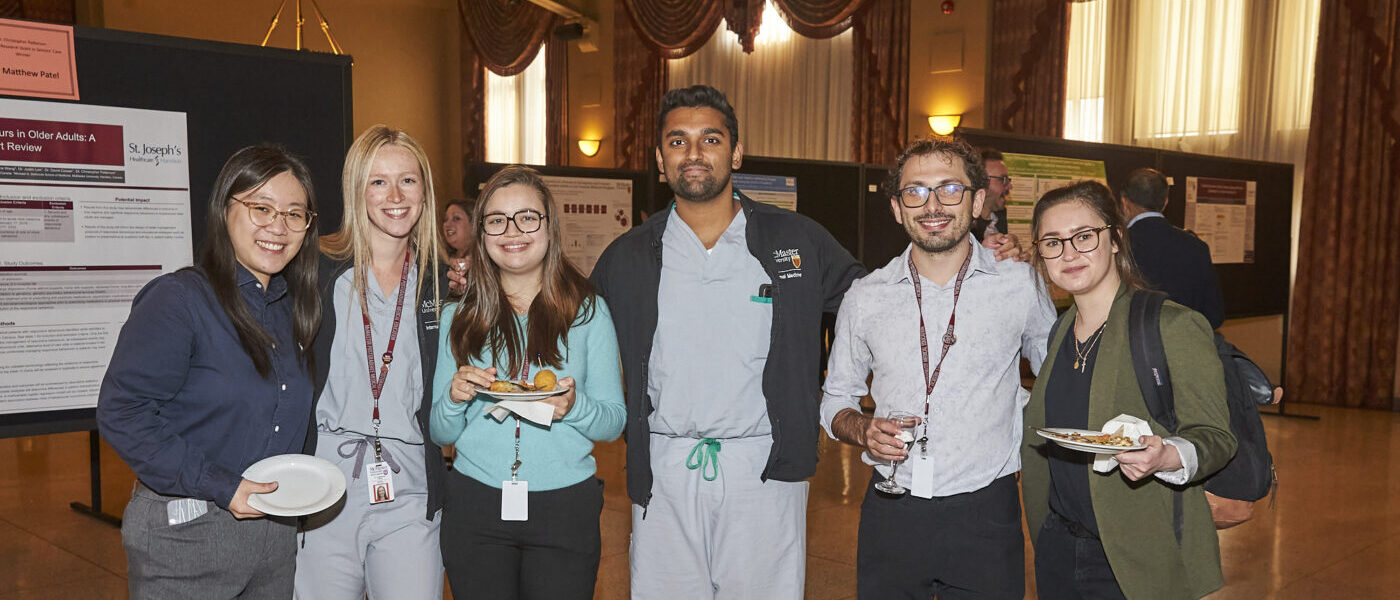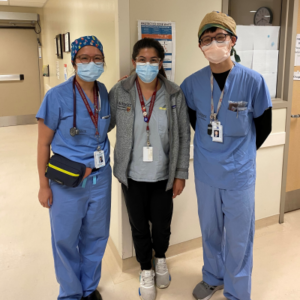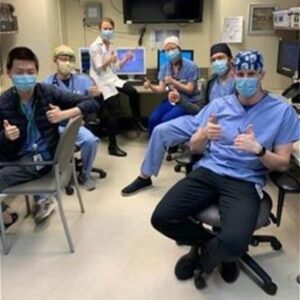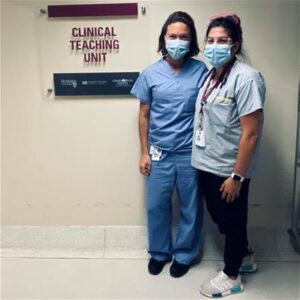OVERVIEW
Residency Program at McMaster
Welcome to the McMaster Internal Medicine Residency Program! It is truly a rewarding experience to be the director of such a dynamic program. The training for internal medicine residents is based at either the Hamilton Campus or the Waterloo Campus. What could be better than having the opportunity to observe each resident building a remarkable set of skills in just three short years of core internal medicine training? A residency program is a journey of professional discovery that should be designed to equip a learner with all the tools needed to prepare for a successful career. Our program office, deputy program directors and our dedicated teaching faculty work together to deliver on this promise. The work is hard, but we want you to keep healthy and to develop lifelong friendships and fond memories along the way!

Program Director

Ombudsperson
Resident Support
Our program has an active Wellness Committee that hosts social events, wellness initiatives and a bi-monthly newsletter. Support services through resident affairs are readily available and easy to access. All residents are encouraged to take advantage of peer and faculty mentorship opportunities, especially during the first year of training. Dr. Oren Levine, Department of Oncology is the Ombudsperson who acts as a confidential advocate for either an individual resident or for the collective resident cohort.
Resident Testimonials
When I was going through the interview process, McMaster’s Internal Medicine residency program really stood out to me for its strong sense of camaraderie amongst co-residents, excellent quality of education, good exposure to a variety of sub-specialties, and the program leadership’s dedication to supporting trainees. As I reflect on my experience so far, I think the biggest highlights have been the wonderful relationships I’ve formed with my co-residents (I’ve met some of my closest friends here!), and the faculty who have been exceptionally supportive and invested in our careers. My decision to choose McMaster IM is reaffirmed each day, and I am exceptionally grateful to have found a home here. — M. Wong, 2026 grad class
Thank you for your unwavering commitment to supporting residents. The program’s transformative changes over the past two years are a true reflection of its leadership’s dedication to advocating for us, residents. Beyond that, the sense of collegiality here at McMaster Internal Medicine is unmatched—we’re not just colleagues, we’re a family. I am truly proud to be part of this program and very grateful for the support I have personally received. — M. Garas, 2025 grad class
Joining the McMaster University Internal Medicine program as an international medical graduate, I immediately felt welcomed and at ease by the senior learners and faculty. Early exposure to critical care and the gradual increase in responsibility ensured I was prepared for the role of a senior resident during my first year. As a senior resident, I felt supported while being allowed to guide patient care. I believe the program offers the ideal balance of clinical exposure and teaching, while offering opportunities for residents to be involved in leadership and committee roles, academic scholarship and research. Training at McMaster University internal medicine residency program, ensured my future success in subspecialty training and beyond. — M. Patel, 2024 grad class
Entry Requirements
- Canadian medical graduates should submit separate applications to the program for the Hamilton campus and/or Waterloo campus through The Canadian Resident Matching Service (CaRMS) in their last year of medical school.
- International medical graduates (IMG) who are Canadian citizens or Permanent Residents of Canada apply through CaRMS for IMG-specific places in the program.
- The program also accepts a limited number of candidates who are sponsored by institutions that have a sponsorship agreement with McMaster. Applications are submitted through the sponsorship office. More details can be found on the Postgraduate Medical Education website.
- McMaster Postgraduate Medical Education does not have a pathway for self-funded residency.
Equity, Diversity & Inclusion
In the past decade, both medicine and society have seen a shift towards improving Equity, Diversity and Inclusion (EDI) for its populations. It is important for healthcare teams to understand and address the needs of marginalized patients and diverse communities. As residents and future licensed physicians, EDI plays a crucial role in our mandate of patient-centred care and life-long learning and, as such, medical education has shifted to prioritize these values in its learners.
The program has recently developed a Resident Education Subcommittee for Equity, Diversity and Inclusion, co-chaired by a resident and a faculty supervisor. The purpose of this committee is to improve and incorporate the EDI curriculum into our internal medicine training. The committee’s initiatives and events include:
- Developing EDI learning activities for trainees within internal medicine and determining ways in which colleagues can improve EDI skills
- Reviewing ways in which the internal medicine program contributes to the McMaster and local EDI communities
- Reviewing or recommending ways in which diversity can be enhanced within the internal medicine program including, but not limited to, the CaRMS admission process
To learn more about residency programs at McMaster University, we invite you to review the McMaster University Postgraduate Medical Education YouTube video and experience the warmth of Hamilton.
Information Box Group
Program Features
Discover our program through a virtual tour.
Program Highlights
Internal medicine residency at McMaster is a fast-paced program organized to build a strong skillset within the first year of training to serve as a solid platform for learning. Residents will care for a diverse population with a broad range of diseases. A by-product of our busy services is the tremendous clinical experience to be gained. To accommodate the impact of Competency-Based Medical Education (CBME) and the PGY3 Royal College examinations, significant changes have been made to reduce the service load to protect teaching time and promote resident wellness.
Our program is structured with the goal of preparing residents for a gratifying career of their choosing. McMaster is a rich environment for learning and innovation in clinical practice, education and research. Foundations for learning are solid and there are many opportunities for enrichment that are readily available to all residents. Some features of our program include:
Our expert faculty is strong, collegial and committed to teach.
Our program is responsive to change. A time-sensitive approach is taken to respond to feedback from residents and faculty. A positive approach to new and innovative models of teaching will keep the program fresh and strong.
Our residents are valued as agents of change. Our program is highly resident-centred. Every committee is populated by resident members from all three years who stimulate important changes based on collective feedback from their cohorts.
Patient selection is diverse and varied. The Hamilton community serves over 1.5 million persons and draws from many surrounding communities to provide exemplary tertiary/quaternary care. A Clinical Teaching Unit (CTU) is placed within each of the three teaching sites and each of these facilities has been designated as a centre of excellence for at least one of the medical subspecialties.
Graded responsibility is commensurate with a resident’s ability to demonstrate competence within a given task. The academic curriculum, workplace training opportunities, style of teaching and level of supervision are geared to match a resident’s stage of training. The curriculum and scheduled rotations are designed for PGY1 residents to acquire fundamental skills in acute care medicine early in training. Residents are prepared to assume the Senior Medical Resident (SMR) role on Day 1 of their PGY2 year.
A Competitive Block Elective Opportunity in Uganda is offered to three PGY3 residents per year. The elective is supervised by McMaster internal medicine faculty with interest in Global Health and who have developed close ties with the healthcare team at the Mulago Hospital in Kampala, Uganda. Please review the department’s Global Health page for more information.
Leadership & Teaching
The resident learns to be a leader by participating in committees and project work in areas involving program planning, educational scholarship, research, advocacy, etc. Our program encourages professional growth by providing faculty mentorship to residents who step forward into a committee role as a co-chair or as a leader of resident innovations.
The resident learns to be an educator with the opportunity to participate in the teaching of clinical skills to undergraduate medical students. The program offers regular active workshops for Teach-the-Teacher to provide observed and evaluated experiential learning opportunities for residents to educate junior learners in areas such as procedural skills, OSCE examinations, conducting difficult conversations, acute in-hospital resuscitation, etc.
Academic Curriculum
Core Clinical Training
The program attracts applicants who are dedicated to delivering high-quality care and who are enthusiastic about the discipline of internal medicine; who demonstrate intelligence, dedication, efficiency and commitment to patient care; who wish to learn the skills of evidence-based medicine so that they can ultimately practice medicine in accord with its tenets. There are four active hospital sites that offer inpatient and ambulatory clinical training experiences.
There are 13 blocks per year filled by a combination of clinical experiences as listed under each postgraduate designation.
PGY-1
- 3 blocks medical clinical teaching units (CTU)
- 1 block CTU hybrid team, combining daytime emergency room (ER) consults with follow-through ward care
- 2 blocks ambulatory care clinics, including 1 block in the Boris Ambulatory CTU
- 2 blocks intensive care unit
- 4 – 5 blocks medicine subspecialties*
- 1 block maximum of selectives outside of medicine, i.e., emergency medicine, psychiatry, radiology
PGY-2
- 3 blocks senior medical resident (SMR) on CTU
- 1 block MD-based SMR
- 2 blocks nephrology
- 1 block ICU
- 1 block cardiac care unit (CCU) or complete in PGY3
- 1 block cardiology ward (if not done in PGY1)
- 1 – 2 blocks elective (3 blocks total in the PGY2 or 3 year)**
- Four weeks ambulatory clinics and four weeks research, (either PGY2 or PGY3) two-week modules, paired with night float
- 1 or more blocks medicine subspecialties*
PGY-3
- 2 blocks teaching medical resident, including 2-week periop experience
- 1 block directed selective or preceptor-based junior attending
- 1 block Team D, combining daytime ER consults with follow-through ward care
- 1 block ICU, unless 3 ICU electives undertaken
- 1 block GIM community (if not taken in PGY2)***
- 1 two-week rotation on Boris Ambulatory CTU
- 1 block CCU (if not taken previously)
- 2 – 8 blocks medicine subspecialties *
- 1 – 2 blocks elective (if not taken previously)**
- 1 block ambulatory clinics and 1 block research or 2 blocks ambulatory clinics (if not taken previously)
* Medicine subspecialty elective/selective opportunities at McMaster include: cardiology, clinical pharmacology, endocrinology, gastroenterology, geriatrics, hematology, immunology/allergy, infectious diseases, medical biochemistry, medical oncology, nephrology, neurology, palliative care, respirology, rheumatology.
** External electives occur pre-CaRMS, except under exceptional circumstances. PGY3 residents can apply for a fully-funded competitive block elective in Uganda.
***Royal College required community selective in general internal medicine to be done at a centre outside of the university footprint. Community electives in some regional areas may be funded by Mac-CARE for lodging or travel.
PGY-4
- First year of a two- to three-year subspecialty training program, or
- Fourth year of training in internal medicine where residents combine required Royal College elements and electives to meet special objectives for their careers
Call Duties
Several recent independent audits indicate the call requirements at McMaster are well within the Professional Association of Residents of Ontario (PARO)-Council of Academic Hospitals of Ontario (CAHO) collective agreement and are at par with other Canadian internal medicine programs.
- Junior medical resident (JMR) call for PGY1s is rotational – 1:4 during CTU and ICU; four calls per month for other block rotations.
- Senior medical resident (SMR) call for PGY2 and PGY3 is largely on a night float model.
Organized Non-Clinical Training
Aside from the necessary clinical experience, the program offers a well-developed academic and research curriculum that allows residents to obtain the skills necessary for a successful career. A variety of methods for non-clinical teaching are organized to address individual styles of learning with a focus on activities that are targeted to maximize resident participation.
There is protected time for a weekly academic half-day, Grand Medical Rounds, as well as regularly scheduled CTU Rounds, Journal Clubs, subspecialty rounds, workshops and retreats. The formal teaching activities are tailored to the various stages of resident training. There are separate curricula for Evidence-Based Medicine, Clinical Skills, Problem–Based Learning, Research, SMR preparation, CMR preparation, Simulation, Leadership/Management and other professional competencies.
Academic Half-Day in lecture format occurs during PGY1 and the first two blocks of PGY2. Thereafter, the content is led by faculty facilitators through small group Case-Based Learning (CBL).
A State-of-the-Art Center for Simulation-Based Learning at McMaster Medical Centre provides access to high-fidelity simulation and Standardized Patients to support resident training opportunities. Each teaching hospital houses a simulation room for on-site training during clinical duty hours.
The Point of Care Ultrasound (PoCUS) Curriculum runs at McMaster’s Centre for Simulation-Based Learning. The curriculum is customized in terms of content and skill level to target residents during each of the three years of training. A McMaster group of faculty and residents published the first paper in the medical literature describing an organized three-tiered internal medicine training PoCUS curriculum.
Preparation for the PGY3 Royal College Examinations includes:
- Focused clinical exam prep teaching provided to the PGY3 residents by the GIM subspecialty residents
- A 14-week exam review series of lectures for the PGY3 residents hosted by a group of subspecialty residents
- Written and OSCE practice examination organized for all residents each year
Research
Resident research and scholarly activity are highly supported under the leadership of Dr. Darryl Leong. World-renowned faculty researchers in many fields act as experienced mentors and supervisors. Academic Half Day curriculum includes dedicated sessions focused on analyzing research methodologies and critical appraisal through evidence-based medicine. The Department of Medicine Annual Residents’ Research Day offers opportunity for research dissemination, including judge-selected prizes. Research funding for clinical, basic, educational and quality improvement research is available through an annual grant competition. Four weeks of protected research time is provided in the senior curriculum, or residents on a clinician-researcher path can propose a longitudinal project with protected days across their clinical schedules. Funding for conferences is available through the program.
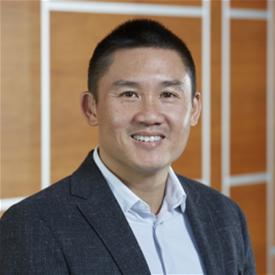
Director, Resident Research
Research Excellence & Discovery Day 2024
Expandable List
| Award | Author | Title | Supervisor |
|---|---|---|---|
| Oral Presentation Gold | Justin Senecal, PGY2 | Diagnostic accuracy of erythropoietin and Jakpot in predicting JAD2-positive erythrocytosis: a retrospective cohort study | Dr. Siraj Mithoowani |
| Oral Presentation Silver | Garrett McDougall, ER PGY2 | Direct laryngoscopy versus video laryngoscopy for intubation of critically ill patients: a systematic review, meta-analysis and trial sequential analysis or randomized trials | Dr. Sameer Sharif, Dr. Bram Rochwerg |
| Oral Presentation Bronze | Julieta Lazarte, PGY1 | Investigating the clinical and therapeutic implications of RyR2 truncating variants | Dr. Jason Roberts |
| Scientific Poster First | Ghazal Haddad, PGY2 | Corticosteroids in Cardiogenic Shock: A Retrospective Analysis of the MIMIC-IV Database | Dr. Bram Rochwerg |
| Scientific Poster Second | Saumya Bansal, PGY2 | The impact of the after-hours CAREchart program in assessing and triaging after-hours patient inquiries and an analysis of the changes to service access over the course of the COVID-19 pandemic | Dr. Peter Ellis |
| Clinical Poster First | Paul Mundra, PGY1 | Recurrent Pericardial Effusions and Intrapericardial Thrombi of Unknown Etiology: A Case Report | Dr. Filipe Cirne |
| Clinical Poster Second | Devyani Bakshi, PGY2 | A case of pediatric serum sickness like reaction (SSLR) after a 2-month re-exposure to amoxicillin | Dr. Susan Waserman |
| Medical Specialties Scientific First | Hon Shen P’ng, Nephrology fellow | Kidney transplantation outcomes among patients with multiple myeloma: systematic review of case reports and case series | Dr. Azim Gangji |
| Medical Specialties Clinical First | Christina Ma, PGY4 Rheumatolgoy | Neurologic Symptoms Associated with Localized Scleroderma En Coup de Sabre – A Case Study | Dr. Maggie Larché |
| Award | Faculty |
| Clinical Teaching Unit Award, Hamilton General | Dr. Amna Ahmed |
| Clinical Teaching Unit Award, St. Joseph’s Healthcare | Dr. John Neary |
| Medical Specialties Rotation Teaching Award | Dr. Andrew Kapoor, Infectious Diseases |
| Community Preceptor Award | Dr. Michael Wang, Waterloo Regional Campus |
| Rotation Award | Palliative Care, St. Joseph’s Healthcare |
Electives
McMaster University offers a wide variety of electives within the medicine specialty. Clerks and residents are welcome to undertake electives in subspecialty programs, as well as general internal medicine.
Student Electives
Please follow all instructions for MD electives using the Association of Faculties of Medicine of Canada (AFMC) student portal.
Resident Electives
Contact Information for Medicine Subspecialty Rotations
For resident electives in General Internal Medicine, please contact the GIM program directly.
Waterloo Campus
Overview
McMaster University’s Waterloo Regional Campus (WRC) is a robust community-based internal medicine residency training program. We combine excellent internal medicine clinical training in a community environment with the academic and research support of our Hamilton campus to effectively prepare residents for practice as a generalist or a subspecialist. We seek to prepare our residents to effectively deal with the full range of medical patients with chronic multi-system disease to the critically ill.
The program is organized into 13 block rotations per year, each of four weeks duration. Clinical rotations occur at the three main hospitals in Hamilton (St. Joseph’s Healthcare, Hamilton General Hospital and Juravinski Hospital), as well as the two main teaching hospitals in the Waterloo Wellington Region: Grand River Hospital and St. Mary’s General Hospital. Within the Kitchener-Waterloo (KW) area, additional placements may occur at Guelph General Hospital in Guelph and Cambridge Memorial Hospital in Cambridge (both within a thirty-minute drive) but these placements are less frequent.
Clinical exposure is broad. Grand River Hospital hosts several regional programs including the Grand River Regional Cancer Centre, Hepatobiliary Surgical Program, Regional Stroke and Renal disease programs and a large Mental Health Program. It is home to a busy General Internal Medicine Rapid Access Clinic, a 30-bed Clinical Teaching Unit and a 22-bed Level III Critical Care Unit.
St. Mary’s General Hospital is a Regional Cardiac Care Centre and a Centre of Excellence for Respiratory and Centre of Thoracic Care. Both sites are equipped with video conferencing capabilities and both sites are busy with 65,000 – 75,000 emergency room (ER) visits per year. The two hospitals receive constant referrals from outside hospitals and trainees are exposed to a huge variety of pathologies from peripheral communities. Finally, these two hospitals are conveniently located fewer than four kilometers apart.
Program Highlights
Small, close-knit program: With just three residents per year, our faculty to learner ratio and hands-on opportunities for patient care and procedural skills are highly conducive to the development of strong mentorships and clinical confidence.
Resident-centred: We are committed to involving residents in all major decisions affecting the nature of the program. We seek and act upon resident feedback and involve them in planning and enacting the educational growth and development of our campus. Each resident’s trajectory through the program is specifically designed to help them meet their specific professional and career goals.
Strong relationship with McMaster University’s Hamilton Campus: Waterloo Regional Campus residents have access to and participate in each and every highlight of the Hamilton campus, including our highly acclaimed annual international health elective in Uganda, numerous academic retreats and social events and access to mentorship from world class research and academic faculty. WRC residents also participate in McMaster’s well-developed academic curriculum through a combination of video conferencing and locally hosted sessions.
Clinical placements at a variety of hospital and clinic sites: Our residents have access to clinical training at a host of hospital sites, including four teaching hospitals in Hamilton and multiple community hospital sites across the Waterloo-Wellington Region. Because of the regional nature of many of our clinical programs, residents are exposed to a wide variety of pathology from peripheral communities and a multitude of procedural opportunities. Consistently integrated ambulatory care experiences are also a key feature the Community-Based Program.
Electives: Our residents have the opportunity to take three external electives anywhere in Canada during their core training years, approved by the program director. At least two occur before the start of PGY3 and all occur before the PGY4 Canadian Resident Matching Service (CaRMS) match.
Research Contacts
Visit the WRC Research website to learn more about the research performed in the Waterloo region.
Information Box Group
Elective Opportunities
Review our program release (PDF) for more information aboout electives in the Waterloo region.
Partner hospitals and highlights of the community:
Contact Us
Information Box Group
Jan Taylor
Internal Medicine Residency Program Senior Administrator

Jan Taylor
Internal Medicine Residency Program Senior Administrator
Rebecca Kruisselbrink
MD
Assistant Clinical Professor
Regional Education Lead, Waterloo Regional Campus

Rebecca Kruisselbrink
MD
Assistant Clinical Professor
Regional Education Lead, Waterloo Regional Campus
Darryl Leong
MBBS (Hons), MPH, M.Biostat, PhD
Associate Professor
Director Resident Research, Cardio-oncology Fellowship Director
Research Interests: Physical frailty and multi-morbidity
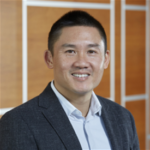
Darryl Leong
MBBS (Hons), MPH, M.Biostat, PhD
Associate Professor
Director Resident Research, Cardio-oncology Fellowship Director
Jan Taylor
Internal Medicine Residency Program Senior Administrator
Jan Taylor
Internal Medicine Residency Program Senior Administrator
Rebecca Kruisselbrink
MD
Assistant Clinical Professor
Regional Education Lead, Waterloo Regional Campus
Rebecca Kruisselbrink
MD
Assistant Clinical Professor
Regional Education Lead, Waterloo Regional Campus
Darryl Leong
MBBS (Hons), MPH, M.Biostat, PhD
Associate Professor
Director Resident Research, Cardio-oncology Fellowship Director
Research Interests: Physical frailty and multi-morbidity
Darryl Leong
MBBS (Hons), MPH, M.Biostat, PhD
Associate Professor
Director Resident Research, Cardio-oncology Fellowship Director
Research Interests: Physical frailty and multi-morbidity




